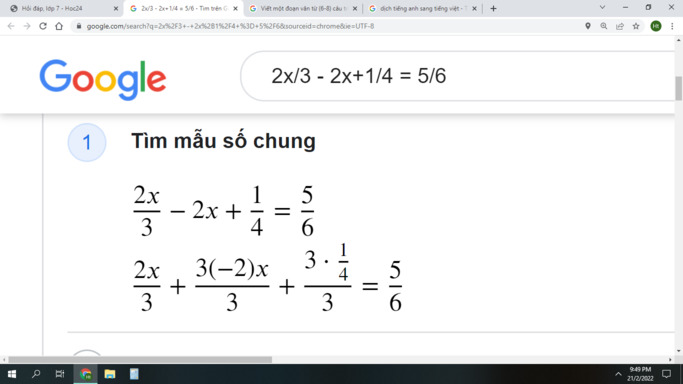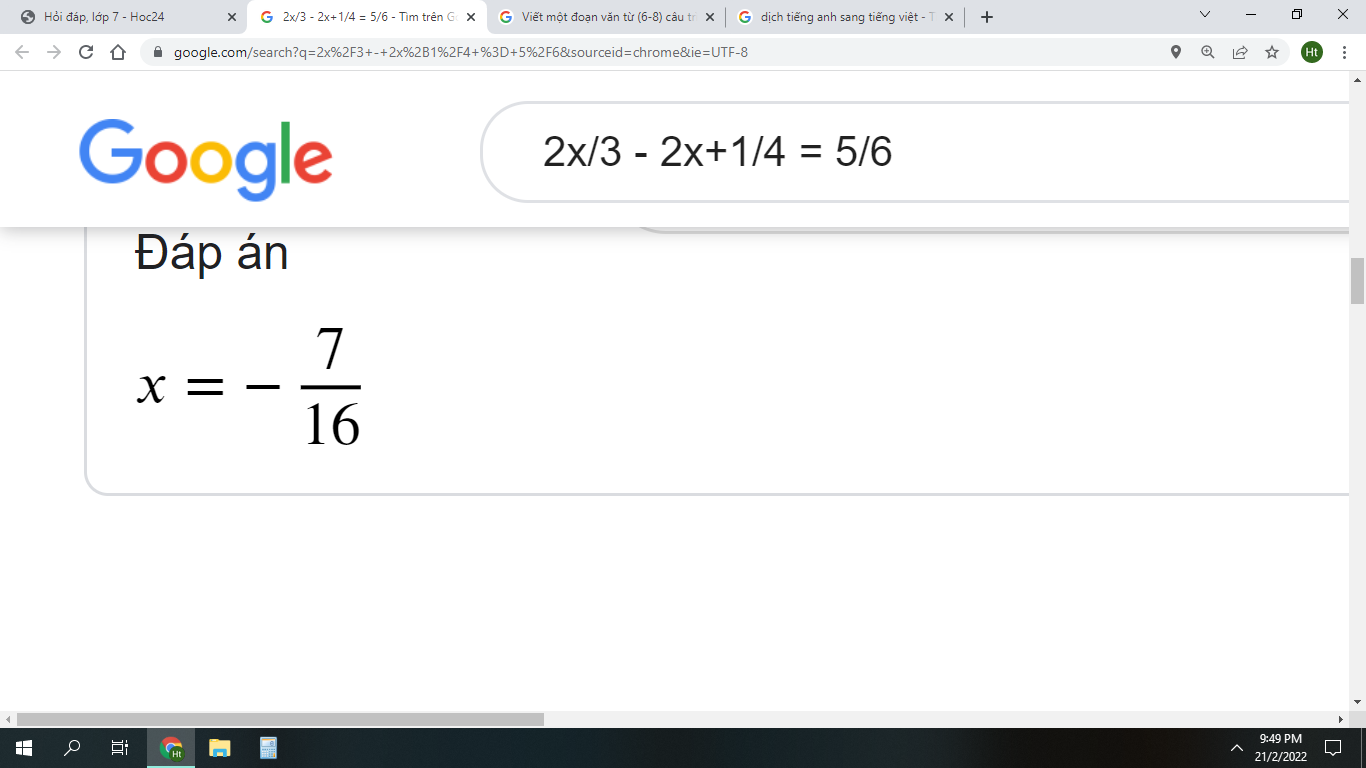
Hãy nhập câu hỏi của bạn vào đây, nếu là tài khoản VIP, bạn sẽ được ưu tiên trả lời.


2x + ½ = -5/3
2x = -5/3 - 1/2
2x = -13/6
x = -13/6 : 2
x = -13/12
1/7 - 3/5 x = 3/5
-3/5 x = 3/5 - 1/7
-3/5 x = 16/35
x = 16/35 : -3/5
x = -16/21
-3x - ¾ = 5/6
-3x = 5/6 + 3/4
-3x = 19/12
x = 19/12 : (-3)
x = -19/36
3/7 - 1/2 x = 5/3
-1/2 x = 5/3 - 3/7
-1/2 x = 26/21
x = 26/21 : (-1/2)
x = -52/21
2x - ¾ = 5/8
2x = 5/8 + 3/4
2x = 11/8
x = 11/8:2
x = 11/16
¼ x - |-7/5| = -5/3
¼ x - 7/5 = -5/3
¼ x = -5/7 + 7/5
¼ x = 24/35
x = 24/35 : 1/4
x = 96/35

a: 3-2|4x-5|=2/6
=>2|4x-5|=3-1/3=8/3
=>|4x-5|=4/3
=>4x-5=4/3 hoặc 4x-5=-4/3
=>4x=19/3 hoặc 4x=11/3
=>x=19/12 hoặc x=11/12
c: (7-3x)(2x+1)=0
=>2x+1=0 hoặc -3x+7=0
=>x=-1/2 hoặc x=-7/3
d: 2x(5-3x)>0
=>x(3x-5)<0
=>0<x<5/3

đã hơn 3 năm rồi nhưng chưa có ai giải, mà 3 năm rồi bn cx ko cần nx.

Bạn có thẻ viết đề bằng công thức toán được không? Viết như thế này rất khó nhìn í.

* Trả lời:
\(\left(1\right)\) \(-3\left(1-2x\right)-4\left(1+3x\right)=-5x+5\)
\(\Leftrightarrow-3+6x-4-12x=-5x+5\)
\(\Leftrightarrow6x-12x+5x=3+4+5\)
\(\Leftrightarrow x=12\)
\(\left(2\right)\) \(3\left(2x-5\right)-6\left(1-4x\right)=-3x+7\)
\(\Leftrightarrow6x-15-6+24x=-3x+7\)
\(\Leftrightarrow6x+24x+3x=15+6+7\)
\(\Leftrightarrow33x=28\)
\(\Leftrightarrow x=\dfrac{28}{33}\)
\(\left(3\right)\) \(\left(1-3x\right)-2\left(3x-6\right)=-4x-5\)
\(\Leftrightarrow1-3x-6x+12=-4x-5\)
\(\Leftrightarrow-3x-6x+4x=-1-12-5\)
\(\Leftrightarrow-5x=-18\)
\(\Leftrightarrow x=\dfrac{18}{5}\)
\(\left(4\right)\) \(x\left(4x-3\right)-2x\left(2x-1\right)=5x-7\)
\(\Leftrightarrow4x^2-3x-4x^2+2x=5x-7\)
\(\Leftrightarrow-x-5x=-7\)
\(\Leftrightarrow-6x=-7\)
\(\Leftrightarrow x=\dfrac{7}{6}\)
\(\left(5\right)\) \(3x\left(2x-1\right)-6x\left(x+2\right)=-3x+4\)
\(\Leftrightarrow6x^2-3x-6x^2-12x=-3x+4\)
\(\Leftrightarrow-15x+3x=4\)
\(\Leftrightarrow-12x=4\)
\(\Leftrightarrow x=-\dfrac{1}{3}\)

Bài 1:
- \(\dfrac{11}{2}x\) + 1 = \(\dfrac{1}{3}x-\dfrac{1}{4}\)
- \(\dfrac{11}{2}\)\(x\) - \(\dfrac{1}{3}\)\(x\) = - \(\dfrac{1}{4}\) - 1
-(\(\dfrac{33}{6}\) + \(\dfrac{2}{6}\))\(x\) = - \(\dfrac{5}{4}\)
- \(\dfrac{35}{6}\)\(x\) = - \(\dfrac{5}{4}\)
\(x=-\dfrac{5}{4}\) : (- \(\dfrac{35}{6}\))
\(x\) = \(\dfrac{3}{14}\)
Vậy \(x=\dfrac{3}{14}\)
Bài 2: 2\(x\) - \(\dfrac{2}{3}\) - 7\(x\) = \(\dfrac{3}{2}\) - 1
2\(x\) - 7\(x\) = \(\dfrac{3}{2}\) - 1 + \(\dfrac{2}{3}\)
- 5\(x\) = \(\dfrac{9}{6}\) - \(\dfrac{6}{6}\) + \(\dfrac{4}{6}\)
- 5\(x\) = \(\dfrac{7}{6}\)
\(x\) = \(\dfrac{7}{6}\) : (- 5)
\(x\) = - \(\dfrac{7}{30}\)
Vậy \(x=-\dfrac{7}{30}\)

a) \(A\left(x\right)=x^7-2x^6+2x^3-2x^4-x^7+x^5+2x^6-x+5+2x^4-x^5\)
\(A\left(x\right)=(x^7-x^7)+(-2x^6+2x^6)+2x^3+(-2x^4+2x^4)+(x^5-x^5)-x+5\)
\(A\left(x\right)=2x^3-x+5\)
- Bậc của đa thức A(x) là 3
- Hệ số tự do: 5
- Hệ số cao nhất: 2
b) \(B\left(x\right)=-3x^5+4x^4-2x+\dfrac{1}{2}-2x^4+3x-x^5-2x^4+\dfrac{5}{2}+x\)
\(B\left(x\right)=(-3x^5-x^5)+(4x^4-2x^4-2x^4)+(-2x+x+3x)+\left(\dfrac{1}{2}+\dfrac{5}{2}\right)\)
\(B\left(x\right)=-4x^5+2x+3\)
- Bậc của đa thức B(x) là 5
- Hệ số tự do: 3
- Hệ số cao nhất: \(-4\)
c) \(C\left(y\right)=5y^2-2.\left(y+1\right)+3y.\left(y^2-2\right)+5\)
\(C\left(y\right)=5y^2-2y-2+3y\left(y^2-2\right)+5\)
\(C\left(y\right)=5y^2-2y-2+3y^3-6y+5\)
\(C\left(y\right)=5y^2-2y+3+3y^3-6y\)
\(C\left(y\right)=5y^2-8y+3+3y^3\)
\(C\left(y\right)=3y^3+5y^2-8y+3\)
- Bậc của đa thức C(y) là 3
- Hệ số tự do: 3
- Hệ số cao nhất: 3

tham khảo

nó khác đề nhau ý bn, mk cũng tra rồi